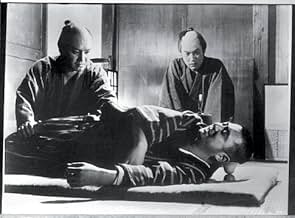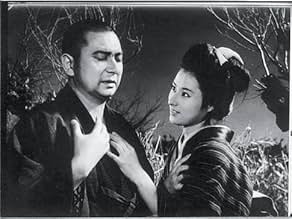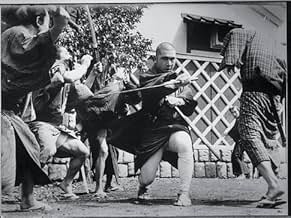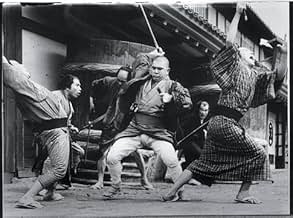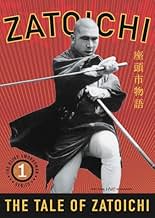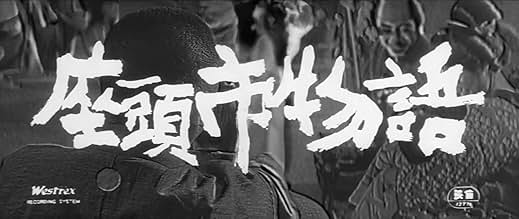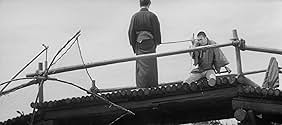अपनी भाषा में प्लॉट जोड़ेंThe adventures of a blind, gambling masseur who also happens to be a master swordsman.The adventures of a blind, gambling masseur who also happens to be a master swordsman.The adventures of a blind, gambling masseur who also happens to be a master swordsman.
- पुरस्कार
- कुल 1 नामांकन
- Masakichi
- (as Toshirô Chiba)
- Yahei
- (as Yoshito Yamaji)
फ़ीचर्ड समीक्षाएं
Others have described this movie well, so, I will only add something that I noticed while watching the scene of Ichi fishing with the ailing samurai. What made the scene so compelling was not what was said, but, the effective use of silence between them. The pauses in dialog were masterful, especially the long lull at the end of the sequence. It reminded me of some of Kurosawa's work.
I recommend this movie, not as the first Zatoichi that you see; but, rather as something to experience after a few of the more exciting movies...after you've developed a relationship with the character.
There are several elements that make this movie so outstanding. First of all, the film's authentic settings bring the culture and history of rural Japan to life in a very authentic way. Secondly, the protagonist convinces as a man who relies on his moral compass and cleverness first and foremost and only draws a sword if he doesn't have any other choice. Thirdly, the numerous side characters are quite interesting as well, especially Zatoichi's wise opponent Hirate, the ruthless criminal Tate and his proud but desperate sister Otane who ends up falling in love with Zatoichi. Fourthly, the dialogues are really to the point and add something to characters and plot unlike many contemporary martial arts flicks. Fifthly, the few fight sequences in the movie are carefully choreographed and would go on to inspire any other genre film that would follow this movie.
By today's standards, The Tale of Zatoichi might not be the most vivid genre film but it's crafted in an artistic, detailed and intellectual manner that still stands out far over five decades after its initial release. Any martial arts fan should give this movie a chance. I would highly recommend the stunning Criterion Collection of the Zatoichi movies that truly offers value for money. Movies of this quality are rarely made nowadays and should be hold in high regard.
In this first episode of a series that covered two decades, Ichi is hired by a gang leader to defeat a consumptive samurai who's been imported by a rival gang. The two swordsmen meet while fishing and become friends, but destiny has decreed they must fight each other, and only one will survive
Fans of action movies may be disappointed with ZATOICHI MONOGATARI, because there's virtually no fighting for the movie's first hour. Instead, there's unusual emphasis on character development. Ichi himself receives much of the attention, and Shintaro Katsu (who also played the role in all the sequels) presents us with a subtle, complex portrayal of the reluctant mercenary. His scenes with the enamored sister of one of the gang members and with the mortally sick samurai are played with great sincerity without becoming sentimental. These two characters are also sensitively portrayed. Even many of the crooks are carefully established as individuals.
The climax won't disappoint action fans, though. Beginning with a flurry of gang skirmishes, frenetically edited to a throbbing score, it ends on a bitter and almost tragic note after the inevitable confrontation between the two protagonists.
Director Kenji Misumi embellishes the slow build-up with a succession of captivating black-and-white compositions and attention to period detail. A degree of pace is maintained by making scene transitions with cuts rather than dissolves. Sets are given visual depth by being framed with foreground objects. The camera is often positioned slightly above or below the characters' eye-lines. Very precise interior lighting creates interesting patterns on and around the actors. By contrast, the daytime exteriors are overly bright and tend to disrupt the mood.
Far from being a typical samurai movie, ZATOICHI MONOGATARI is an unusually somber yet effective period drama, and probably the best entry in the long series it inaugurated.
क्या आपको पता है
- ट्रिवियाThe "mon" coins used by the gamblers were made of either copper or iron and were the lowest-denomination currency in Japan until the yen system was established in 1870. The "ryo" paid to Zatoichi were gold and were worth many thousands of "mon." The Currency Museum of the Bank of Japan estimates that one "ryo" would be worth roughly $1200 to $1300 now.
- गूफ़In the moonlit scene by the pond, Tane tells Zatoichi that she has a facial mole exactly like his. But neither character has any such mole.
- भाव
Tane: You have a mole here. I wonder if it's a lucky mole. I have one just like it. They say it means I'll have lots of children.
Zatôichi: It's a lucky mole.
Tane: What would I do with so many children.
Zatôichi: Just don't raise them to be yakuza.
Tane: I won't. But why do you say that?
Zatôichi: Because to be a yakuza is a foolish way to live.
Tane: Then why don't you live a decent life?
Zatôichi: It's like being stuck in a bog. It's not easy to pull yourself out once you've fallen in.
- कनेक्शनFeatured in Best in Action: 1961 (2018)
टॉप पसंद
विवरण
- रिलीज़ की तारीख़
- कंट्री ऑफ़ ओरिजिन
- भाषा
- इस रूप में भी जाना जाता है
- The Tale of Zatoichi
- उत्पादन कंपनी
- IMDbPro पर और कंपनी क्रेडिट देखें
- चलने की अवधि1 घंटा 36 मिनट
- रंग
- ध्वनि मिश्रण
- पक्ष अनुपात
- 2.35 : 1
इस पेज में योगदान दें


